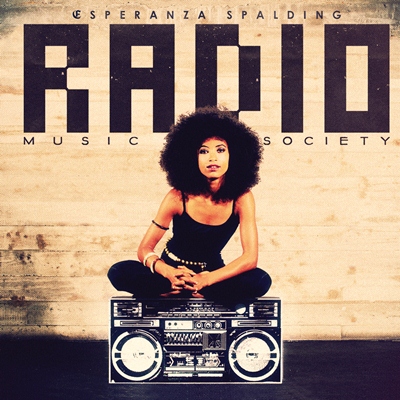Esperanza Spalding | Radio Music Society
Esperanza Spalding
Radio Music Society
(Heads Up International)
by Brent Faulkner
Esperanza Spalding, then relatively unknown to the masses, accomplished a feat previously unaccomplished by any jazz artist in 2011; she won the Grammy award for Best New Artist. Spalding’s victory could be viewed shocking considering she defeated more visible popular artists including Justin Bieber and Drake. While the Grammy could be considered Spalding’s ‘crowning’ achievement, it logically accompanies a rich, captivating biography, highlighted in its entirety on her website (http://www.esperanzaspalding.com).
Spalding’s career is nothing short of miraculous. Influenced by cellist Yo Yo Ma at a young age, she taught herself to play violin. After playing violin in several community orchestras, Spalding began playing the bass expanding her scope from classical to include numerous styles. After obtaining a GED at 15, she attended college on a music scholarship, eventually earning a B.M. from the Berklee College of Music, where she’d eventually be appointed the school’s youngest faculty member (age 20). Eventually, solo albums Junjo, Esperanza, and Chamber Music Society would precede her underdog Grammy win. Building off the momentum of a colorful career, Spalding returns with another fine effort, 2012’s Radio Music Society. Crossing elements of jazz, classical and soul, Radio Music Society is the culmination of Spalding’s musicianship to date.
“Radio Song” opens the effort strongly, featuring Spalding singing neutral syllables in jazz-fashion on “la” (“la, la, la, la…”). As expected, the bass lines are creative, working well in tandem with an exceptional percussive groove to buttress the arrangement. Throughout the colorful opener, the horn orchestrations are delightful, not to mention the vocal production. Spalding sounds nothing short of a pro, delivering nuanced, ‘tongue-in-cheek,’ ‘jazzed-up’ vocals. Spalding keeps great company, featuring jazz vocalist Gretchen Parlato on background vocals, not to mention some incredibly talented supporting musicians in Leo Genovese (piano) and Daniel Blake (saxophone). Much like Spalding sings on the hook, “this song’s the one…”
“Cinnamon Tree” is none too shabby itself, with Jody Redhage contributing a sound cello performance while Spalding and company are in ‘classical’ mode. The tempo is noticeably slower than the opener, contrasting and providing a different ‘flavor.’ After the opening, the track takes on an R&B/soul quality, which suits Spalding as well as anything else. Though less technical than the angularity and quirks that characterize “Radio Song,” “Cinnamon Tree” is another winner. “Crowned & Kiss” finds Spalding being assisted by hip-hop royalty in Q-Tip. Spalding’s horn orchestrations are exceptional with the ultimate effect of the sound best characterized as ‘easygoing.’ Spalding remains polished and refined as both vocalist and songwriter. Highlights of “Crowned and Kissed” include Jeff Galindo’s exceptional trombone solo, as well as the angularity of the vamping section.
“Land of the Free” offers yet another contrast, finding Spalding accompanied solo by the organ of James Weidman. Weidman’s gospel-tinged, bluesy sound proves to be the perfect palette – never overpowering nor under-powering Spalding’s commanding voice. The cut closes in a cliffhanger that sends a clear message about the state of freedom; Spalding fails to finish the statement as she sings, “…in the land of the…” First single “Black Gold” features vocalist Algebra Blesset and guitarist Lionel Loueke. The harmonic progression is soulful with jazz sensibility. As always, the arrangement is superb, featuring solid guitar contributions from Loueke, background singing from the Savannah Children’s Choir, and organ contributions from Raymond Angry. Vocally, Spalding and Blesset blend extremely well, yielding a fine vocal chemistry. As simple as the refrain is, it is incredibly beautiful: “You are black gold, black gold…”
“I Can’t Help It” finds Spalding covering Stevie Wonder with the aid of famed saxophonist Joe Lovano. With a pack of great harmonized background vocalists (again including Parlato), Spalding continues to strike gold. Joe Lovano’s saxophone lines are subtle but tasteful, giving off a ‘cool’ vibe, further accentuated by punches from a Fender Rhodes. “Hold On Me” proceeds, finding Spalding and her combo (Janice Scroggins and Billy Hart) accompanied by the American Music Program. The cut is the first to feature Spalding on acoustic bass. At just over three and a half minutes, “Hold On Me”’s brevity is appreciated, even if it fails to compare to the best cuts like “Radio Song.”
“Vague Suspicions” reignites any lost momentum, opening with a mysterious guitar ostinato provided by Ricardo Vogt. Spalding continues to play acoustic bass, accompanied by legendary jazz drummer Jack DeJohnette. Daniel Black contributes ‘woodwind’ duties doubling on flute and soprano sax. Speaking of soprano sax, the blend between it and trombone is a lovely, well conceived timbre. Vocally, Spalding remains ‘on top.’ “Endangered Species” is even more alluring. Lalah Hathaway is a guest vocalist on this Wayne Shorter/Joseph Vitarelli penned classic. Spalding adds her influence by penning the lyrics and contributing to the arrangement. Leo Genovese opens the cut with a geumbri, a three stringed bass instrument. Spalding returns to electric bass here, delivering more athletic aggressive lines, and Darren Barrett’s muted trumpet solo can’t be left out.
“Let Her” is angular, featuring more creative bass lines from Spalding’s incredibly harmonic imagination. Asymmetric meter adds yet another dimension to the cut, not to mention Leo Genovese’s soloing on Rhodes. The closing cuts are a bit less distinct. “City of Roses” finds Spalding once again accompanied by American Music Program and delivering fast-paced vocals. Thara Memory’s horn orchestrations are a highlight. “Smile Like That” is solid, though not the best of the effort; Gilad Hekeslman’s guitar solo is noteworthy.
Overall, Radio Music Society is a great album, transcending jazz and including elements of classical, soul, and blues. There are no overt misses, though some tracks are more creative than others. Spalding’s musicianship is undeniable. She’s the ‘real deal.’
Brent Faulkner
The Urban Music Scene
